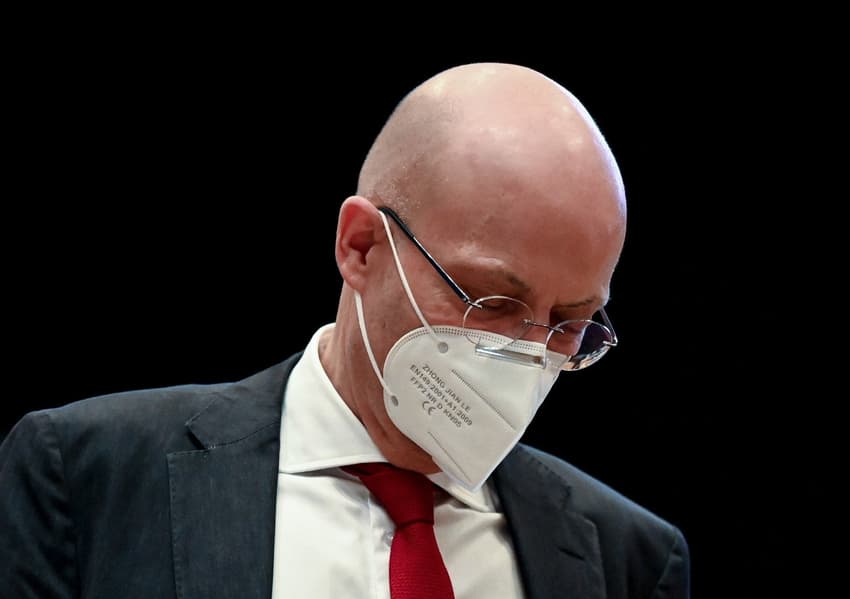Mayor of German city of Halle suspended for skipping vaccine queue

A German mayor was suspended by his own city
council after it emerged he had received a coronavirus vaccination in January,
despite not being in a priority group.
An overwhelming majority of 34 councillors voted late Wednesday to temporarily suspend Bernd Wiegand, mayor of the central city of Halle.
Wiegand, 64, had previously admitted to receiving the vaccine in January, at a time when it was still only available to older citizens.
READ ALSO: When will I be in line for a Covid-19 vaccination in Germany?
Other city employees and several councillors also reportedly received a jab before their turn.
The mayor denied that he had acted illegally or immorally, however, saying he had been offered the jab in order to avoid excess doses going to waste.
"It's easy to criticise my decision in hindsight... but it was not unlawful in any way," he said in a statement in March, suggesting that the scandal was being exploited to "remove a nonpartisan mayor from office".
Yet his explanations have also varied over time, with Wiegand at one point erroneously claiming that he had been selected at random to receive the excess dose.
The mayor must now await the results of a disciplinary procedure and an investigation by local prosecutors, though he could yet appeal his suspension at an administrative court.
After raiding Wiegand's offices in February, prosecutors said he was suspected of "misappropriating some of the vaccine doses available to the city since December 2020", but stressed the presumption of innocence.
Germany's vaccination rollout has been slower than expected amid supply issues across the EU, with 13 percent of the population currently having received at least one dose.
Wiegand is also not the only German politician embroiled in a pandemic-related scandal.
Several MPs from Angela Merkel's conservative CDU/CSU alliance have been forced to step down in recent weeks over allegations of corruption in the procurement of protective masks.
The graft scandal has hit Merkel's party in the polls, with the conservatives slumping to record lows of just over 25 percent six months before September's general election.
READ ALSO: Suspect arrested in Germany's 'face mask scandal'
Comments
See Also
An overwhelming majority of 34 councillors voted late Wednesday to temporarily suspend Bernd Wiegand, mayor of the central city of Halle.
Wiegand, 64, had previously admitted to receiving the vaccine in January, at a time when it was still only available to older citizens.
READ ALSO: When will I be in line for a Covid-19 vaccination in Germany?
Other city employees and several councillors also reportedly received a jab before their turn.
The mayor denied that he had acted illegally or immorally, however, saying he had been offered the jab in order to avoid excess doses going to waste.
"It's easy to criticise my decision in hindsight... but it was not unlawful in any way," he said in a statement in March, suggesting that the scandal was being exploited to "remove a nonpartisan mayor from office".
Yet his explanations have also varied over time, with Wiegand at one point erroneously claiming that he had been selected at random to receive the excess dose.
The mayor must now await the results of a disciplinary procedure and an investigation by local prosecutors, though he could yet appeal his suspension at an administrative court.
After raiding Wiegand's offices in February, prosecutors said he was suspected of "misappropriating some of the vaccine doses available to the city since December 2020", but stressed the presumption of innocence.
Germany's vaccination rollout has been slower than expected amid supply issues across the EU, with 13 percent of the population currently having received at least one dose.
Wiegand is also not the only German politician embroiled in a pandemic-related scandal.
Several MPs from Angela Merkel's conservative CDU/CSU alliance have been forced to step down in recent weeks over allegations of corruption in the procurement of protective masks.
The graft scandal has hit Merkel's party in the polls, with the conservatives slumping to record lows of just over 25 percent six months before September's general election.
READ ALSO: Suspect arrested in Germany's 'face mask scandal'
Join the conversation in our comments section below. Share your own views and experience and if you have a question or suggestion for our journalists then email us at [email protected].
Please keep comments civil, constructive and on topic – and make sure to read our terms of use before getting involved.
Please log in here to leave a comment.